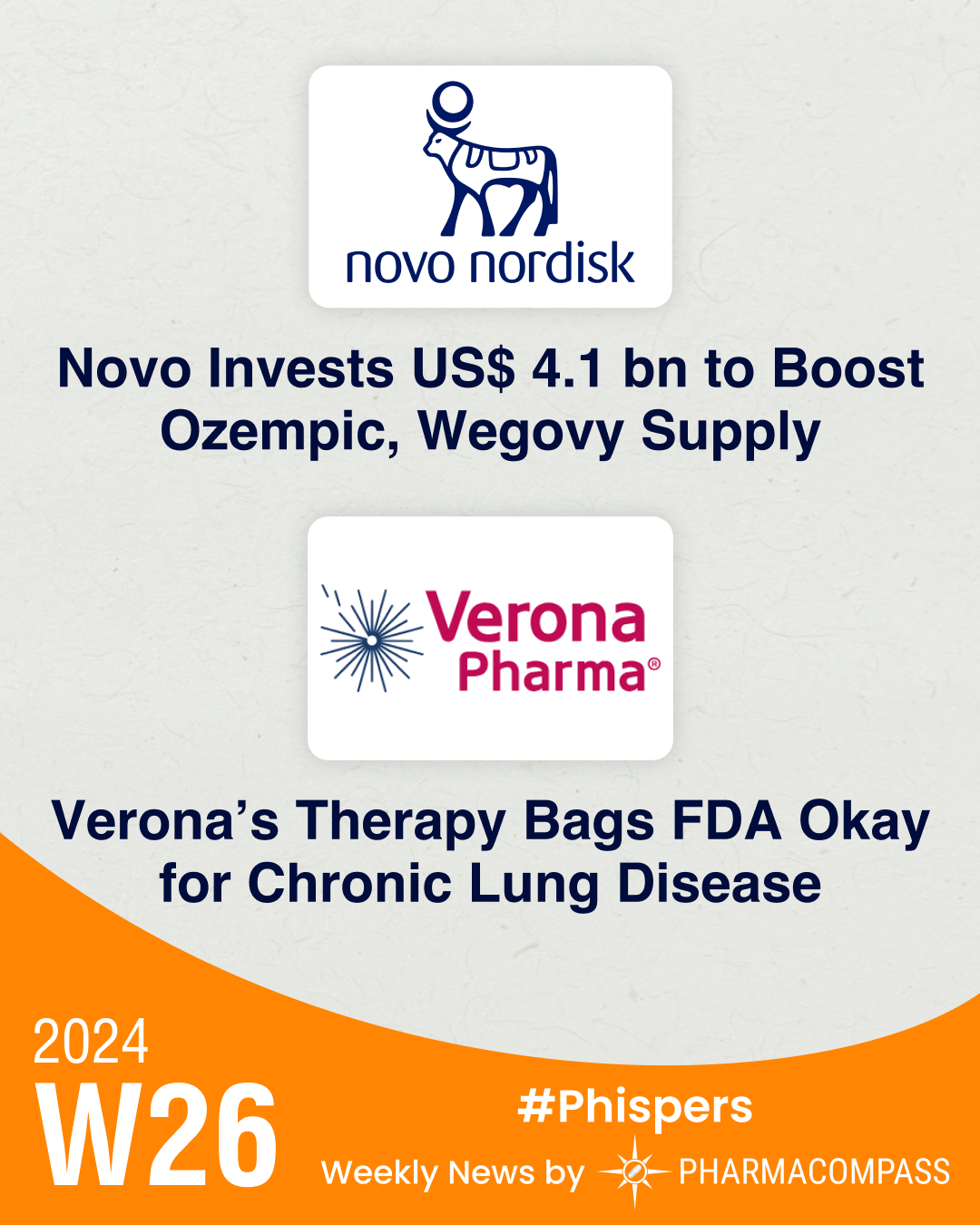
By PharmaCompass
2024-06-27
Impressions: 1,223 (Article) || 4 (Video)
This week saw a couple of developments in the lucrative US market for glucagon-like peptide-1 (GLP-1) drugs that treat diabetes and obesity. Novo Nordisk is investing US$ 4.1 billion to develop a new facility in North Carolina to boost the supply of Ozempic and Wegovy. And Israel’s Teva Pharmaceuticals has launched a generic version of Novo Nordisk’s Victoza to treat type 2 diabetes.
In approvals, the US Food and Drug Administration (FDA) has approved Verona Pharma’s drug for chronic obstructive pulmonary disease (COPD), a chronic lung disease. The agency has expanded the use of Sarepta Therapeutics’ gene therapy for Duchenne muscular dystrophy (DMD) in patients aged four and above who cannot walk, despite the drug failing in its late-stage trial. Additionally, FDA granted an accelerated approval to BMS’s Krazati, to be used in combination with cetuximab, as a targeted treatment option for adult patients with KRASG12C-mutated locally advanced or metastatic colorectal cancer.
In late-stage trials, Gilead’s twice yearly HIV prevention drug proved to be superior to its daily pill Truvada, which could make it a game changer in the pre-exposure prophylaxis (PrEP) space. AstraZeneca’s blockbuster drug Imfinzi meaningfully improved survival in patients with muscle-invasive bladder cancer. And Merck KGaA has had to scrap a phase 3 trial after its once promising candidate xevinapant failed to show significant survival benefits in patients with locally advanced head and neck cancer.
Novo invests US$ 4.1 billion in new facility in US to boost Ozempic, Wegovy supply
Novo Nordisk is investing US$ 4.1 billion to develop a new manufacturing facility in Clayton, North Carolina (US). The funds will be used to create a 1.4 million square foot facility that fills Ozempic and Wegovy (both semaglutide) injector pens. The Danish drugmaker already operates three facilities at the site. This new 56-acre facility is expected to add 1,000 new jobs to the 2,500 already employed at the other three facilities.
Teva launches first GLP-1 generic in US: Teva Pharmaceuticals has launched a generic version of Novo Nordisk’s Victoza (liraglutide) to treat type 2 diabetes patients, rendering it the first generic for a GLP-1 drug in the United States.
FDA okays Verona’s COPD therapy; AbbVie-Genmab’s Epkinly bags second approval
FDA has approved a therapy for COPD — Ohtuvayre — from Verona Pharma. Ohtuvayre is a new, inhaled non-steroidal, maintenance treatment for COPD in adult patients. The chronic condition causes restricted airflow and breathing problems. According to the company, Ohtuvayre is the first inhaled product with a novel mechanism of action available for the maintenance treatment of COPD in more than 20 years.
Epkinly okayed for follicular lymphoma: After bagging an FDA approval last year for diffuse large B-cell lymphoma (DLBCL), AbbVie and Genmab’s Epkinly (epcoritamab-bysp) has now bagged an accelerated approval in patients with relapsed or refractory follicular lymphoma (FL) who have received two or more prior treatments.
First drug for excessive underarm sweating okayed: FDA has approved the first drug to treat primary axillary hyperhidrosis (excessive underarm sweating). To be sold as a gel, Botanix Pharmaceuticals’ Sofdra (sofpironium) is a new chemical entity that presents a safe and effective solution to patients who suffer from this socially challenging medical condition, the company said.
Gilead’s twice yearly HIV prevention drug found to be superior to daily pill Truvada
In a late-stage study, Gilead’s long-acting injection has proven to be more effective in preventing HIV infection in women compared to the daily pill Truvada (emtricitabine/tenofovir). This is the first time that an HIV pre-exposure prophylaxis (PrEP) has shown zero infections in a phase 3 trial, the drugmaker said. Dosed just twice a year, lenacapavir could be a game-changer in HIV prevention.
Astra’s Imfinzi chalks up win in treating bladder cancer: AstraZeneca’s Imfinzi (durvalumab) meaningfully improved event-free survival and overall survival in patients with muscle-invasive bladder cancer (MIBC) in a late-stage trial. In the study, Imfinzi was used in combination with chemotherapy before surgery, and as a monotherapy after, and was compared with pre-surgical chemotherapy alone.
Merck KGaA scraps trial after failure in head, neck cancer: Merck KGaA said its candidate xevinapant has failed in a late-stage trial to show significant survival benefits in patients with locally advanced head and neck cancer. An independent data monitoring committee said xevinapant is unlikely to meet the primary endpoint of the study and the German drugmaker is discontinuing it. Xevinapant was seen as a promising drug and Merck had paid €188 million (about US$ 226 million) in upfront cash to acquire its global rights from Debiopharm International.
FDA expands use of Sarepta’s Duchenne gene therapy despite late-stage failure
FDA has granted accelerated approval for the use of Sarepta Therapeutics’ gene therapy for Duchenne muscular dystrophy (DMD) in patients aged four and above who cannot walk. The agency okayed Elevidys (delandistrogene moxeparvovec) for this group despite it missing its primary goals of a late-stage trial. FDA also granted Elevidys a traditional approval for DMD in patients four years of age and above who can walk.
Argenx’s Vyvgart Hytrulo okayed for autoimmune disease: FDA has approved Argenx’s Vyvgart Hytrulo for chronic inflammatory demyelinating polyneuropathy (CIDP), making it a new treatment option for patients with this rare and debilitating neuromuscular disorder. This marks the first drug with a novel, precision mechanism of action in over 30 years for CIDP, Argenx said.
BMS’ Krazati okayed for colorectal cancer: FDA has granted Krazati (adagrasib) an accelerated approval, when used in combination with cetuximab as a targeted treatment option for adult patients with KRASG12C-mutated locally advanced or metastatic colorectal cancer. This is the second approval for Krazati, which works by targeting a mutated form of the gene known as KRAS. It was previously approved to treat KRASG12C-mutated locally advanced or metastatic non-small cell lung cancer.
Lilly, OpenAI join hands to fight antimicrobial resistance; Glenmark recalls drug
Eli Lilly has partnered OpenAI to leverage its generative AI to invent novel antimicrobials that can be used to treat drug-resistant bacteria. Antimicrobial resistance is one of the top public health and development threats across the world.
Glenmark recalls 114 batches of potassium drug: Glenmark has recalled 114 batches in the US of 750 mg potassium chloride extended-release capsules because of failed dissolution. As a result, the capsules may cause high potassium levels, also known as hyperkalemia, which can result in irregular heartbeat that can lead to cardiac arrest, the company said. The recall is voluntary and Glenmark hasn’t received any reports of serious side effects yet.
The PharmaCompass Newsletter – Sign Up, Stay Ahead
Feedback, help us to improve. Click here
Image Credit : Phisper Infographic by PharmaCompass license under CC BY 2.0
“ The article is based on the information available in public and which the author believes to be true. The author is not disseminating any information, which the author believes or knows, is confidential or in conflict with the privacy of any person. The views expressed or information supplied through this article is mere opinion and observation of the author. The author does not intend to defame, insult or, cause loss or damage to anyone, in any manner, through this article.”








